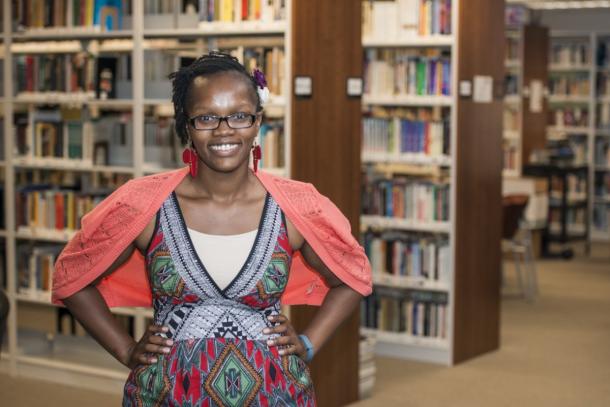Displaced by Genocide, Mason Student Plans to Help Other Refugees
PhD, Conflict Analysis and Resolution, School for Conflict Analysis and Resolution
M.S., Conflict Analysis and Resolution, The School for Conflict Analysis and Resolution (S-CAR)
 |
Claudine Kuradusenge has few clear memories of her native Rwanda, but what she remembers the most is the refugee camp.
“I remember the smells of blood, the screams, and the agonizing feeling of loss,” she said. “But I can’t remember my mother’s face.”
She was six years old in 1994 when her family fled the ruthless government-led genocide that killed between 500,000 and one million Tutsis and moderate Hutus in a 100-day span. While the memories of her homeland are obscure or, understandably, blocked in her mind—many family members were killed during the genocide, her younger sister died in the camp and her mother was killed in the aftermath resettlement—the nightmares of the brutal violence and extensive human loss haunted her well after her relocation in Belgium.
Kuradusenge, now a PhD student at George Mason University’s School for Conflict Analysis and Resolution (S-CAR), knows firsthand the meaning of “diaspora.”
“Most immigrants are part of a diaspora community,” she said. “They are refugees who have citizenships in their new homes but are part of a diaspora community because they are still connected to their homelands. I am diaspora myself.”
Kuradusenge is not only researching the diaspora phenomenon for her dissertation but is also in the process of creating a nongovernment organization (NGO) to help displaced populations maintain memories and traditions of their homelands.
“I am studying how conflict shapes how people see themselves, how conflict shapes the way we treat other people,” she said. “I’m looking at how human beings are transformed, how perceived identities are transformed, based on different traumas and based on the narratives we tell about ourselves.”

The NGO, called Community Future Path, will work to empower displaced peoples by helping them maintain homeland traditions and memories while creating positive attitudes of the future.
“What I’m trying to accomplish with my skills is create a new path of understanding the history of Rwanda, or any conflict country. I want to help understand how that history does not determine who we are going to be in the future—we have the power to create the future we want, based on who we are and who we want to be.”
Her professor, Karina Korostelina, said Kuradusenge is uniquely qualified to accomplish her goals.
“Claudine has a rare gift to be persistent in her search for justice and being at the same time able to objectively assess responsibilities and grievances of all parties in conflict,” said Korostelina.
Kuradusenge earned her master’s at George Mason after undergraduate work at Utah Valley University, where a mentor who knew her interests recommended Mason’s internationally known conflict analysis school. The breadth of Mason’s offerings in conflict analysis and resolution was initially a hurdle for her.
“You make the school your home,” she said, “but before I could find the professor and mentor I wanted to work with, I had to find myself. The person I am today is different than the person I was when I started my master’s at S-CAR.”
Write to Buzz McClain at [email protected]
This material is presented as the original analysis of analysts at S-CAR and is distributed without profit and for educational purposes. Attribution to the copyright holder is provided whenever available as is a link to the original source. Reproduction of copyrighted material is subject to the requirements of the copyright owner. Visit the original source of this material to determine restrictions before reproducing it. To request the alteration or removal of this material please email [email protected].
rosters
IMPORTANT LINKS
- Home
- Admissions
- Academics
- Research & Practice
- Center for Peacemaking Practice
- Center for the Study of Gender and Conflict
- Center for the Study of Narrative and Conflict Resolution
- Center for World Religions, Diplomacy, and Conflict Resolution
- Indonesia - U.S. Youth Leadership Program
- Dialogue and Difference
- Insight Conflict Resolution Program
- Parents of the Field Project
- Program on History, Memory, and Conflict
- Project on Contentious Politics
- Sudan Task Group
- Undergraduate Experiential Learning Project
- Zones of Peace Survey
- News & Events
- Student and Career Services
- Alumni
- Giving





